Antique music boxes are charming and nostalgicically beautiful pieces of history that have captured the hearts of collectors and music enthusiasts for centuries. These intricate mechanical instruments, which use a series of pins or teeth on a rotating cylinder or disc to play a musical tune, have a long and fascinating history dating back to the 18th century. From elegant cylinder music boxes crafted by renowned Swiss makers to ornately decorated street organ music boxes, antique music boxes come in a wide variety of shapes, sizes, and styles.
In this blog post, we will delve into the history and different types of antique music boxes, as well as offer tips for collectors on how to evaluate and care for these treasured objects. So whether you are a seasoned collector or simply have a love for all things vintage, join us as we explore the captivating world of antique music boxes.
The origins of the antique music box can be traced back to the 18th century, when Swiss clockmaker Jean-André Reiche (1752-1817) is credited with creating the first functional music box. Reiche’s invention used a series of pins attached to a rotating cylinder to play a musical tune when a handle was turned. These early music boxes were relatively simple in design and could only play a few notes at a time.
Over the next few decades, music box technology advanced rapidly, and the instruments became more complex and sophisticated. Swiss makers, in particular, became known for their high-quality music boxes, which were prized for their intricate craftsmanship and beautiful melodies. By the 19th century, music boxes had become popular among the wealthy as a symbol of status and refinement, and were often given as gifts or displayed as decorative objects.
As the demand for music boxes grew, a number of other countries, including the United States and Germany, began producing their own versions. The American music box industry, which developed in the late 19th century, was particularly successful, and a number of well-known manufacturers, such as the Regina Music Box Company, emerged.
Today, antique music boxes are highly sought after by collectors and enthusiasts, who appreciate the beauty and craftsmanship of these mechanical instruments. They are often considered works of art, and can fetch high prices at auction.
Types of antique music boxes
Antique music boxes come in a variety of types, each with its own unique characteristics and features. Here are some of the most common types of antique music boxes:
Cylinder music box
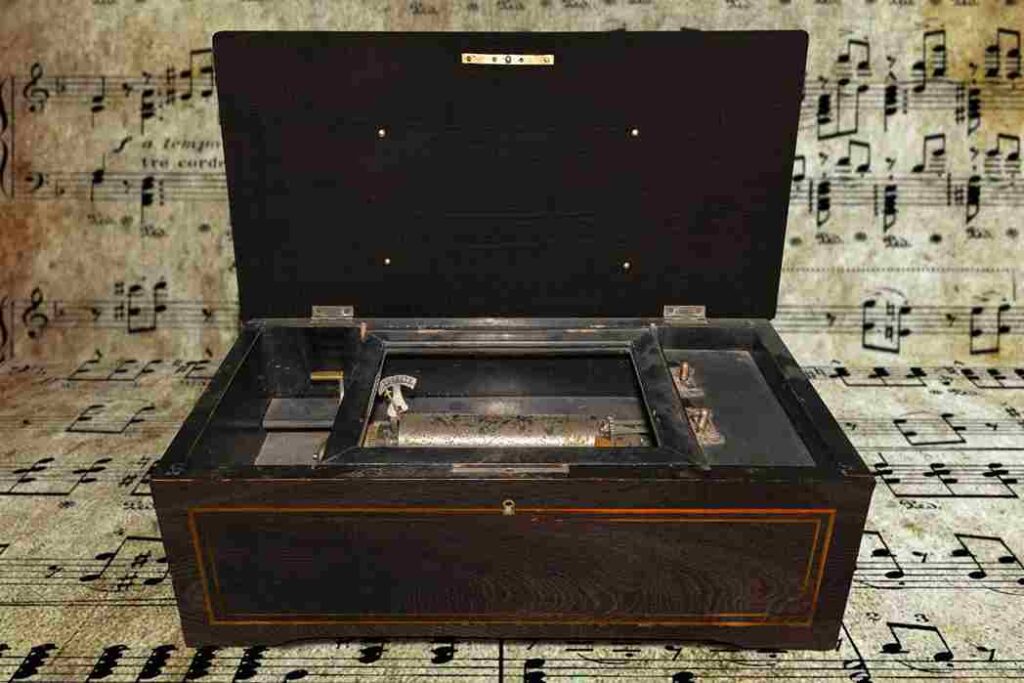
These music boxes use a rotating cylinder with pins or teeth that pluck the teeth of a comb-like mechanism to produce a musical tune. The cylinder is usually made of metal and is wound up by a handle or key. Cylinder music boxes are known for their rich .
Cylinder music boxes were first invented in the late 18th century by Swiss watchmaker, Antoine Favre. Favre’s invention revolutionized the music box industry as it allowed for a cylinder to be filled with pins of various lengths which, when played, produced a melody. This was a vast improvement over the previous music box designs which relied on metal discs with raised and lowered areas to create sounds. Cylinder music boxes quickly gained popularity and were soon being produced all over Europe.
By the 19th century, they were a staple of the music box industry and were manufactured in both Europe and the United States. They were popular with royalty, nobility, and upper-class families around the world who used them to entertain their guests. Today, cylinder music boxes are still popular with collectors and are a sought-after item in the antique music box market.
Disc music box
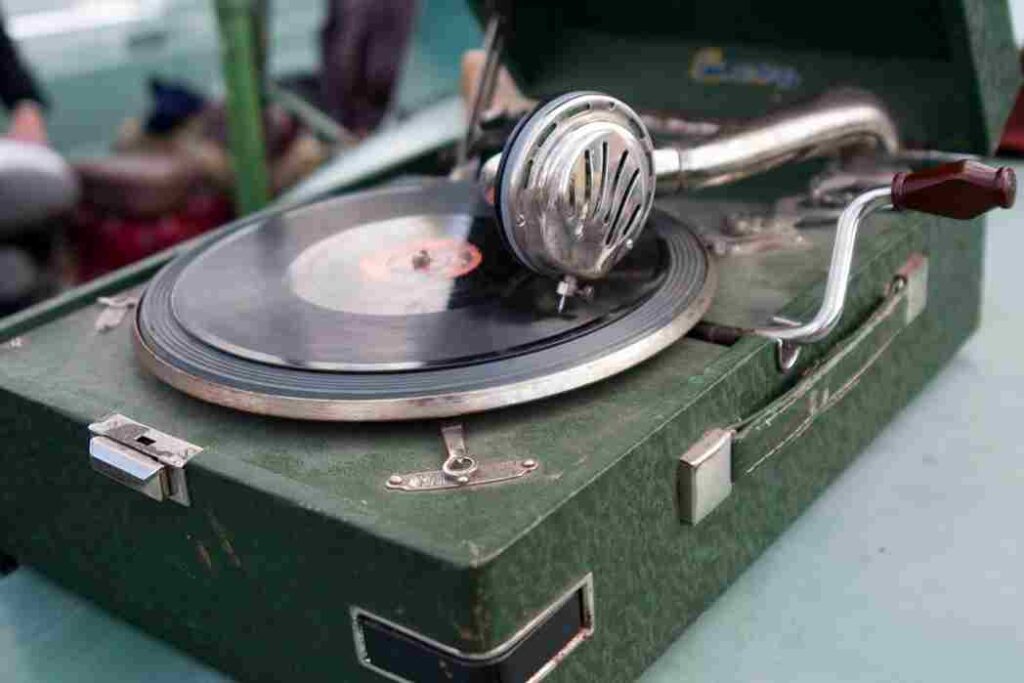
Similar to cylinder music boxes, disc music boxes use a rotating disc with teeth to play a musical tune. However, the disc is usually made of paper or cardboard and is mounted on a spindle. Disc music boxes are generally smaller and simpler than cylinder music boxes.
Disc music boxes were first invented in 1812 by another Swiss watchmaker, Jean-Jacques Hoffmann. His invention enabled music boxes to be powered by a spring motor instead of a hand crank, allowing for the production of more complex music. Disc music boxes quickly gained popularity and became the preferred music box of the 19th century. They were manufactured in both Europe and the United States and used by royalty, nobility, and upper-class families to entertain their guests. Disc music boxes were also popular among the public and could be found in many households. Today, disc music boxes are still popular with collectors and are a sought-after item in the antique music box market.
Street organ music box
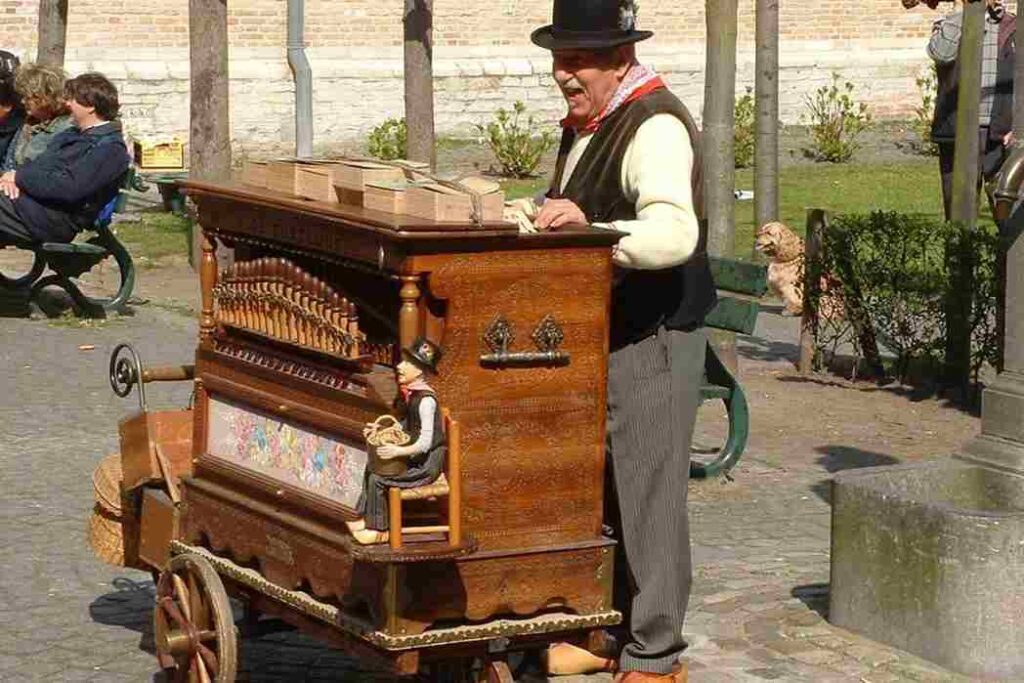
These music boxes, also known as barrel organs or hand organs. They consist of a large wooden cabinet with a handle that is turned to rotate a cylinder with pins or teeth, which play a musical tune. Street organ music boxes were often ornately decorated and could be played by inserting a coin into a slot.
Street organ music boxes were first created in the late 19th century by German watchmaker, Franz Anton Hoffmann. His invention allowed music boxes to be powered by mechanical systems, enabling them to automatically play complex melodies. Street organ music boxes quickly became popular and were soon being produced in both Europe and the United States. These music boxes were often used on the streets to entertain passersby and were a popular sight in the late 19th and early 20th centuries. Today, street organ music boxes are still popular with collectors and are a sought-after item in the antique music box market.
Tabletop music box
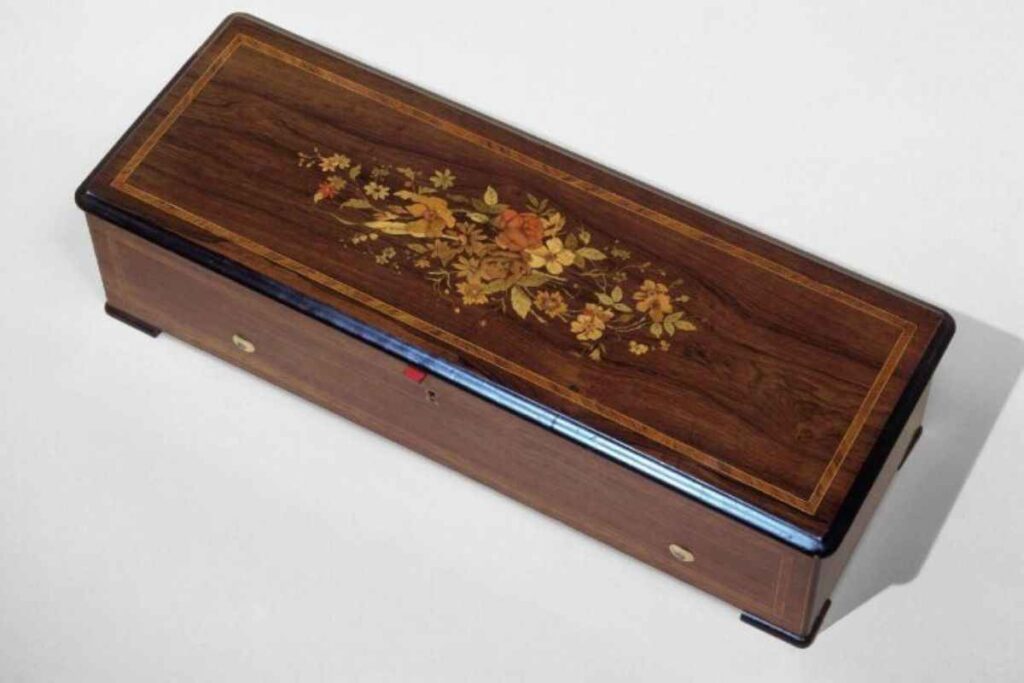
These music boxes are smaller and more portable than other types and are designed to sit on a tabletop or other flat surface. They may use a cylinder or disc mechanism and are often made of wood or metal.
The origins of tabletop music boxes can be traced back to Switzerland, where clockmaker Jean-André Reiche (1752-1817) is credited with creating the first functional music box. Reiche’s invention used a series of pins attached to a rotating cylinder to play a musical tune when a handle was turned. These early music boxes were relatively simple in design and could only play a few notes at a time.
Music box clock
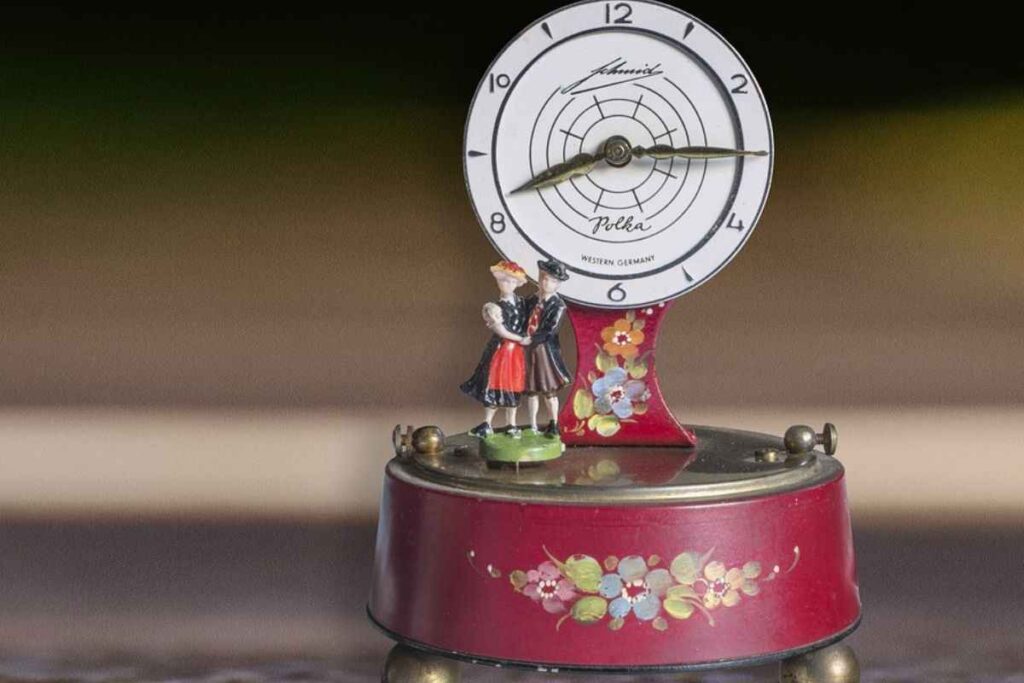
These music boxes are designed to function as both a clock and a music box.Music box clocks have a long and interesting history. The first music box clocks were developed in the late 18th century in Switzerland by clockmaker Jean-Jacques Perrelet. He wanted to create a device that could play music while also functioning as a timepiece. The first music box clocks were made with a comb that had small pins attached to it. When the pins passed over the teeth of the comb, they would produce a musical tone. This type of music box clock was known as a cylinder music box.
In the 19th century, the technology of the music box clock improved drastically. The pins and comb system was replaced by a metal cylinder, which allowed for longer, more complex compositions. This type of music box clock was known as a disc music box. In the late 19th century, the advent of electricity led to the development of the electric music box clock. This type of clock used electricity to power an electric motor, which then turned a cylinder or disc to produce music.
Regardless of the type, antique music boxes are prized for their beauty, craftsmanship, and musicality, and are often highly sought after by collectors.
Caring and restoration about antique music box
Caring for and restoring antique music boxes is essential for preserving the value and beauty of these vintage mechanical instruments. Proper care and maintenance can help ensure that your antique music boxes remain in good condition and continue to function properly. Here are a few tips for caring for and restoring antique music boxes:
Handle with care: Antique music boxes are delicate instruments, and it’s important to handle them gently to avoid damaging them. Use both hands to support the music box when moving it, and be careful not to drop it or knock it against hard surfaces.
Keep them clean: Dust and dirt can accumulate on antique music boxes over time, which can affect their appearance and functioning. Use a soft, dry cloth to gently dust your music boxes on a regular basis, and be careful not to use any harsh cleaning products that could damage the finish or mechanism.
Store them properly: To protect your antique music boxes from damage, it’s important to store them in a safe and secure place. Keep them away from direct sunlight, heat, and humidity, which can all damage the finish and mechanism. Consider storing them in a protective case or box, or in a climate-controlled environment.
Repair any damage: If you notice any damage or malfunction on your antique music box, it’s important to get it repaired as soon as possible. A professional restoration specialist can assess the damage and determine the best course of action, whether it’s cleaning, repairing, or replacing parts.
Protect your collection: To protect your antique music boxes from theft or damage, consider getting insurance for your collection. This can help cover the cost of repair or replacement if something happens to your music boxes.
By following these tips, you can help ensure that your antique music boxes remain in good condition and continue to bring you enjoyment for years to come
Collecting antique music box
Collecting antique music boxes can be a rewarding and enjoyable hobby for those who appreciate the beauty, craftsmanship, and musicality of these vintage mechanical instruments. Antique music boxes come in a wide variety of shapes, sizes, and styles, ranging from elegant cylinder music boxes crafted by renowned Swiss makers to ornately decorated street organ music boxes.
If you’re interested in collecting antique music boxes, there are a few things you should consider:
Know your budget: Antique music boxes can vary widely in price, depending on their condition, rarity, and historical significance. It’s important to set a budget for yourself before you start collecting so you can focus on music boxes that are within your price range.
Research and learn: To become a knowledgeable collector, it’s important to do your research and learn as much as you can about antique music boxes. This can involve reading books and articles, joining collectors’ groups and forums, and attending antique shows and auctions.
Evaluate condition: When evaluating the condition of an antique music box, pay attention to the overall appearance and functioning of the instrument. Check for signs of wear and damage, such as scratches, dents, or missing parts. The condition of the music box can greatly affect its value.
Find a reputable dealer: When purchasing an antique music box, it’s important to work with a reputable dealer who has a good track record and can provide provenance for the piece. This can help ensure that you are getting a genuine antique music box and not a reproduction.
Care for your collection: Proper care and maintenance is essential for preserving the value and beauty of your antique music boxes. Be sure to handle them gently, and keep them clean and dust-free. If you have music boxes that are not in working condition, consider getting them repaired by a professional.
Collecting antique music boxes can be a rewarding hobby that allows you to appreciate the history and craftsmanship of these timeless treasures. With a bit of knowledge and care, you can build a collection of beautiful and unique antique music boxes that you can enjoy for years to come.
Where can find antique music box
There are a number of places where you can find antique music boxes, depending on your interests and budget. Some options for finding antique music boxes include:
Antique stores and dealers: Many antique stores and dealers specialize in vintage music boxes, and can be a good source for finding antique music boxes of all types and price ranges. These stores often have a wide selection of music boxes, and can be a good place to browse and get an idea of what is available.
Auctions and estate sales: Auctions and estate sales can be a good source for finding antique music boxes, as these events often feature a wide range of vintage items. However, it is important to do your research and be prepared to bid or negotiate for the music boxes you are interested in, as prices can vary widely depending on the condition and rarity of the music boxes.
Online marketplaces: Online marketplaces such as eBay and Etsy can be a good source for finding antique music boxes, as they often feature a wide selection of vintage music boxes from around the world. These marketplaces can be a convenient way to shop for antique music boxes, but it is important to be careful and do your research before making a purchase, as some sellers may not be reputable or may not accurately represent the condition of their music boxes.
Overall, finding antique music boxes can be a fun and rewarding experience, and can provide a unique addition to your collection.
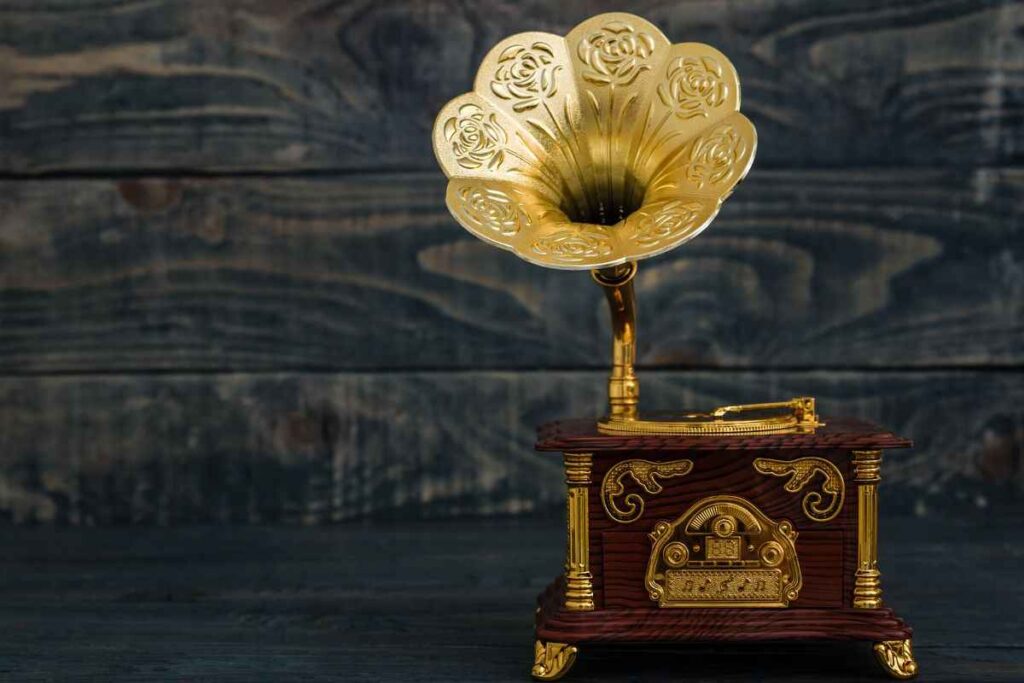
Antique music boxes are a fascinating and rewarding area of collecting, offering a unique glimpse into the history of music and the evolution of musical instruments. These vintage music boxes are prized for their unique character and charm, quality craftsmanship, and potential value as investments and collectibles.
There are many different types of antique music boxes to choose from, ranging from simple cylinder music boxes to complex disc music boxes, and collectors and enthusiasts can find a wide range of music boxes to suit their interests and needs.
Finding and caring for antique music boxes can be a fun and rewarding experience, and requires a combination of careful research, careful handling, and regular cleaning and maintenance to ensure that these valuable and often fragile devices are preserved and protected.
Whether you are a music lover, a collector, or simply someone who appreciates the beauty and charm of antique music boxes, these vintage instruments can be a fascinating and rewarding hobby, and offer a unique window into the history of music and the evolution of musical instruments. So, antique music boxes are a great addition to any collection.
Explore more of our antique wonders: Antique Radio and Antique Cameras.
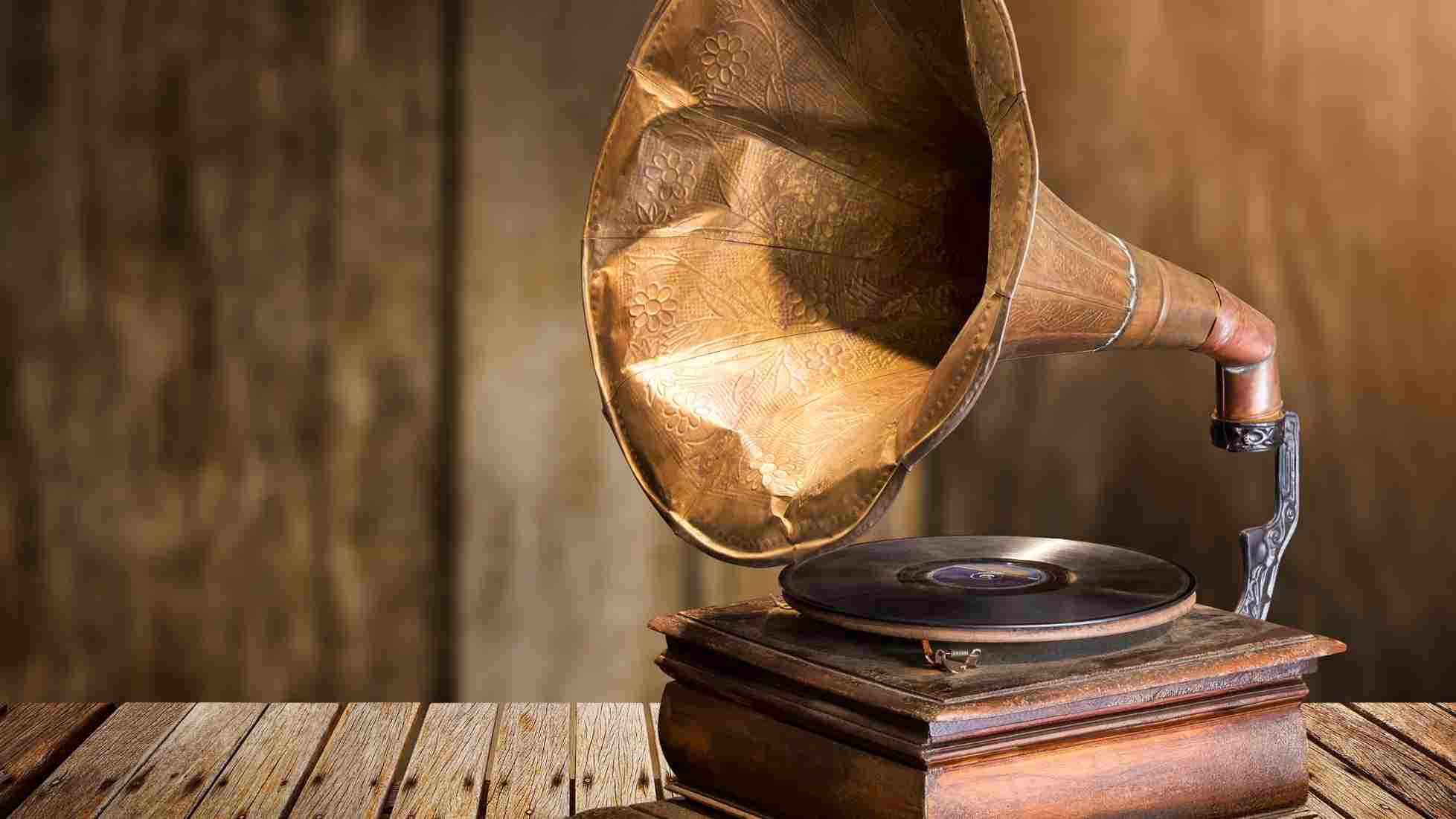
Leave a Reply